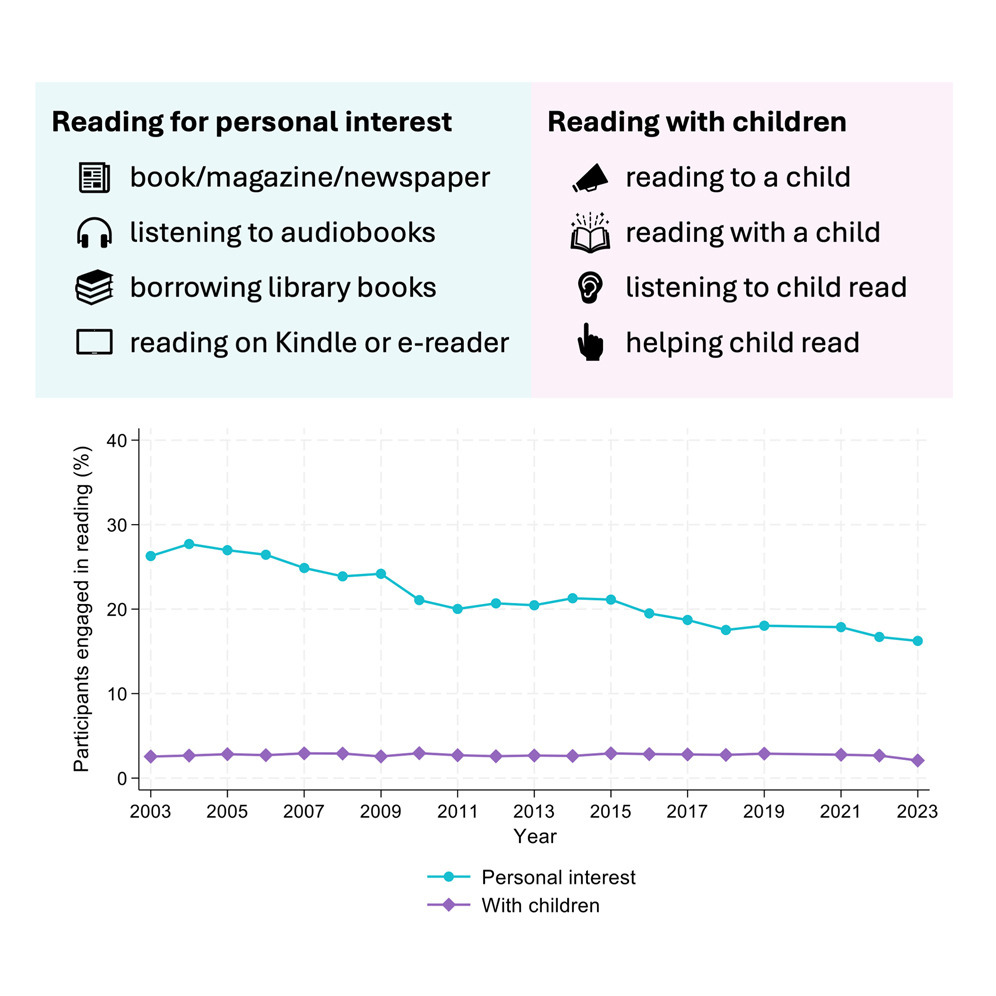The News Letter: Issue #002

READING FOR FUN AND PROFIT.
Say kids, what time is it? It's Moral Panic Time!
"Fewer People Are Ready for Fun" blares The New York Times; "Deeply Concerning" scolds The Guardian; "Why so few Americans read for pleasure" The Washington Post claims to assert. If you were online at some point last week, you no doubt encountered some variation on the theme of "is our children reading" from one of America's many panic-loving publications.
What's behind this latest round of "deep concern"? A recent study published in Cell Press's open access academic journal iScience (impact factor: 4.1) claims that American teens and adults by and large read "for pleasure" significantly less than they did two decades ago. This chart supposedly says it all:

But does this chart actually say it all? No, not at all. In fact, there are quite a few secrets it dares not reveal for fear of being found out as misleading. I'm not particularly interested in fisking this study to death -- I'd much rather just get back to reading my books -- so instead I'll offer up 3 key details from the study that were conveniently ignored or downplayed by the majority of mainstream regurgitations in their rush to make hay of a good headline. These details should, at the very least, lead inquiring minds to conclude that reports of reading's death were, as one uniquely well-read novelist once said, greatly exaggerated.
1. First of all, the American Time Use Survey (ATUS) -- the "continuous" data collection effort conducted by the US Census Bureau -- is a deeply flawed source of information on habits and hobbies for a whole host of reasons, not least of which is that participants are interviewed on random days and asked to describe their activities during the previous day. Was it a Monday? A Saturday? A Holiday? A Summer Friday? Were they on vacation? At a med spa? Did they just get some disappointing news at work? Did someone die? These factors can modify a participant's mood for "pleasure" rather significantly, and should not be discounted. As the researchers themselves acknowledge, "differences between daily and longer-term estimates of reading may partially be driven by the uneven distribution of reading throughout the year..." So if the ATUS interviewer caught an avid reader on a bad day, they would be flagged as a non-reader. Not great!
2. In addition to the fact that the number of participants in the ATUS declined precipitously from 21,000 in 2003 to just 7,700 last year (because who even answers phone calls anymore, let alone from an unknown number?), ATUS also excludes prospective participants who report fewer than five activities during their "diary day." So if you're just bed rotting with a good book -- a common activity, especially on weekends and vacations when people are most likely to read -- the ATUS does not consider your response to be valid. Same for reading as a secondary activity: If you're listening to an audiobook while doing the dishes, you're not technically listening to an audiobook. Yikes!
3. Possibly the most damning detail, however, is the ATUS's haphazard and incomplete attempts over the years to update its definition of "reading," which has left in its wake an inconsistent mess of results that should ultimately render the entire exercise moot. Firstly, the ATUS spent its initial three years counting "reading the Bible and scripture" as "reading for personal interest" (i.e. pleasure), which undoubtedly provided the category with an unfair boost when compared with post-2007 results. Kindles/e-books were only added in 2011 -- another boost, which subsequently declined when those technologies started to fall out of general favor with the rise of smartphones. Finally -- and this is the clincher -- "reading on tablets, computers, or smartphones" is, to this day, not explicitly included in examples provided to ATUS participants, which the researches helpfully note makes it "unclear whether this behavior would have been classified as reading for personal interest or technology use." They continue: "Our reading measures are thus unlikely to have included activities, such as reading blogs or the news online, which may be a form of reading for pleasure. Future surveys should aim to capture these types of reading, differentiating them from mindless scrolling." Thanks a lot!

So reading for pleasure on computers, tablets, or phones doesn't count as reading for pleasure? Someone tell that to you dear reader, because that's what you're doing right now, isn't it? (You are enjoying this newsletter, aren't you??)
And there you have it: Crisis averted. No, but seriously, are fewer Americans reading today versus 20 years ago? Who knows, but probably not. The iScience study (in)conveniently omitted 2020 from its report, allegedly due to incomplete data collection, but that was the year we were all reading a ton of books! And book sales are still way up over pre-pandemic levels. Oh, and even the study is forced to reveal that ATUS participants who were caught reading for pleasure in 2023 did so for longer than their counterparts from the early aughts. How about that!
tl;dr: Go read a book.


At The Newsagent's we're committed to bringing back the lost art of human-first curation (i.e., by humans, for humans). The Mixtape is our semi-regular column curating some random good stuff that's made us happy in the hopes that it'll make you happy too.
THE YOU-DO-YOU MIX:
Side A: Audrey Hobert - "Sue Me"
Get on the Audrey Hobert train now, or be forced to stand in the aisle later.
B-Side: Patti Smith's Substack.
As we rapidly approach the 50th anniversary of her iconic debut studio album Horses, it's as good a time as any to reflect on our collective good fortune to be alive on this planet at the same time as Patti Smith's deeply endearing Substack notebook.
Hidden Track: Going to the movies alone.

Deep Cut: "Turn Loose Our Death Rays and Kill Them All!: The Complete Works of Fletcher Hanks," edited by Paul Karasik
By all accounts a very bad man (R. Crumb once referred to him as a "twisted man") who died frozen and broke and largely discarded by history. Yet his life's work (which was produced over the span of just two years!) is fascinating and subversive and perfectly illustrates the excruciating blurriness of heroism and villainy.
Bootleg: Lafufus.
Fall for a knock-off Labubu? Don't fret it -- flaunt it! Did you know? Troll dolls, the ur-so-cute-they're-ugly monster figurines, were so commonly counterfeited that some of the most famous (infamous?) variants are actually dupes. That's right! The deliriously popular Russ Trolls and Treasure Trolls of 1980s and 90s nostalgia fame are both unlicensed copycats. And now one of them is being used to illustrate the official "Troll doll" wikipedia page! So you see, in the end, it's all the same. That is to say, they all end up in the same landfill.


With nearly half of all websites online in 2013 going dark by 2023, it's only a matter of time before the entire internet of yesteryear is gone. Scary stuff! That's why we've decided to devote an entire section to random cool links from the internet of days past, to prove to future generations that it wasn't always just a bunch of Cocomelon clones and rage-bait fan-edits...
LINKS:
+ Roadside Architecture: Buildings, Signs, Statues & More (Bonus Link: Roadside America)
+ Wright on the Market: Every Frank Lloyd Wright property currently for sale.
+ Cameron's World: "A web-collage of text and images excavated from the buried neighbourhoods of archived GeoCities pages (1994–2009)."
+ Rainy Mood (Rain makes everything better.)
